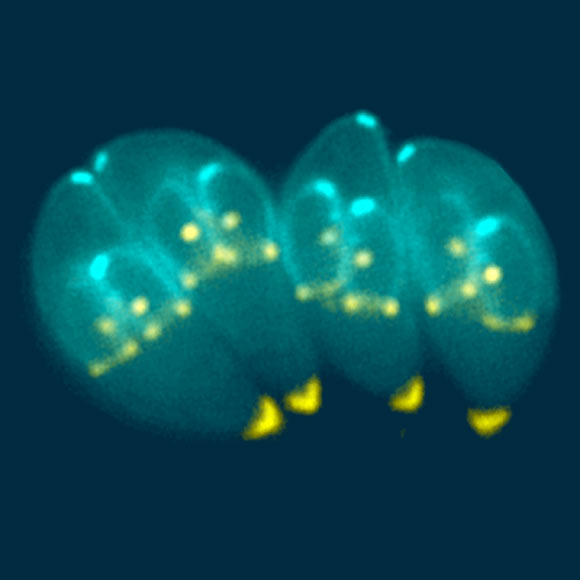Toxoplasmosis, caused by the globally prevalent parasite Toxoplasma gondii, is one of the most common parasitic infections of man and other warm-blooded animals. In a study published in the Proceedings of the Royal Society B, an international team of scientists found that T. gondii-positive individuals were 1.4 times more likely to major in business and 1.7 times more likely to pursue a pursue a management and entrepreneurship emphasis.

Toxoplasma gondii has a unique cytoskeletal apparatus that is probably used for invading host cells and for parasite replication. Shown here are images of Toxoplasma gondii constructing daughter scaffolds within the mother cell. Image credit: Ke Hu & John M. Murray / CC BY 4.0.
Toxoplasmosis is widespread in humans, although its prevalence varies widely from place to place.
In Norway, the United Kingdom and the United States, it is estimated that 9-40% of the population are infected, whereas in Central and South America and continental Europe, estimates of infection range from 50 to 80%.
While rarely associated with acute pathology, T. gondii has been correlated with impulsive behaviors and health outcomes such as increased risk of car accidents, road rage, mental illness, neuroticism, drug abuse and suicide.
The explanation behind these altered behaviors is as disturbing as it is fascinating: because the parasite reproduces sexually only within wild and domestic cats, any changes in host behavior that make them more likely to get eaten by a feline are hypothesized to benefit the parasite.
“As humans, we like to think that we are in control of our actions,” said study co-lead author Professor Pieter Johnson, from the Department of Ecology and Evolutionary Biology at the University of Colorado, Boulder.
“But emerging research shows that the microorganisms we encounter in our daily lives have the potential to influence their hosts in significant ways.”

This is an illustration of the life cycle of Toxoplasma gondii. Image credit: Alexander J. da Silva & Melanie Moser, CDC.
Professor Johnson and colleagues tested the hypothesis that T. gondii infection influences individual- as well as societal-scale entrepreneurship activities.
In a study of 1,495 undergraduate students, they found that the participants who tested IgG positive for T. gondii exposure were 1.4 times more likely to major in business and 1.7 times more likely to have an emphasis in ‘management and entrepreneurship’ over other business-related emphases.
In an additional survey of 197 adult professionals attending entrepreneurship events, infected individuals were 1.8 times more likely to have started their own business compared with other attendees.
The team also compiled national statistics from 42 countries over the past 25 years and found that T. gondii infection prevalences proved to be a consistent, positive predictor of entrepreneurial activity, even when controlling for relative national wealth and opportunity factors.
“Economics research has historically emphasized the importance of rationality in explaining human decisions, with individuals considering benefits and risks before acting in their self-interest,” the scientists said.
“T. gondii exposure, however, might nudge individuals toward higher risk, higher reward activities and deviating from economic theory.”
The study found that nations with a higher infection prevalence saw a lower fraction of respondents cite a ‘fear of failure’ as a deterrent to a new business venture.
“But that’s not to say that all of those businesses will work out or that T. gondii necessarily deserves credit or blame for any individual outcome,” they said.
“We can see the association in terms of the number of businesses and the intent of participants, but we don’t know if the businesses started by T.gondii-positive individuals are more likely to succeed or fail in the long run,” said co-lead author Dr. Stefanie K. Johnson, from the Leeds School of Business at the University of Colorado, Boulder.
“New ventures have high failure rates, so a fear of failure is quite rational. T.gondii might just reduce that rational fear.”
The study authors emphasized that the study is correlational, rather than causal, in nature and that individuals pre-disposed to high-risk behavior could be more likely to be both entrepreneurial in their attitudes and exposed to T. gondii through animal contact.
“Infectious diseases have strongly shaped human history and culture over millions of years,” Professor Johnson said.
“Today, we like to believe our decisions and destiny are ours alone, but the contributing roles of our microscopic companions are increasingly apparent.”
_____
Stefanie K. Johnson et al. 2018. Risky business: linking Toxoplasma gondii infection and entrepreneurship behaviours across individuals and countries. Proc. R. Soc. B 285 (1883); doi: 10.1098/rspb.2018.0822







